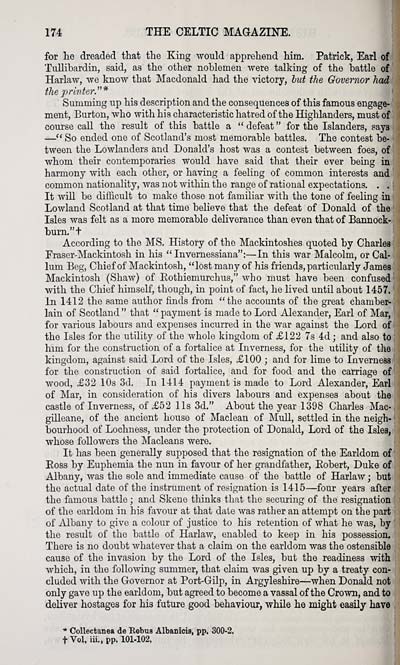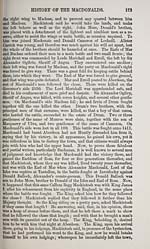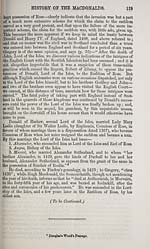Blair Collection > Celtic magazine > Volume 5
(184)
Download files
Complete book:
Individual page:
Thumbnail gallery: Grid view | List view

I
174 THE CELTIC MAGAZINE.
. i
for lie dreaded that the King -would apprehend him. Patrick, Earl of ' |
Tullibardin, said, as the other noblemen were talking of the battle of
Harlaw, we know that Macdonald had the victory, but the Governor had i
tJie printer."* '
Summing up his description and the consequences of this famous engage- ' ^
ment, Burton, who with his characteristic hatred of the Highlanders, must of J
course call the result of this battle a " defeat " for the Islanders, says n
— '' So ended one of Scotland's most memorable battles. The contest be- ' I
tween the Lowlanders and Donald's host was a contest between foes, of ,
whom their contemporaries would have said that their ever being in
harmony with each other, or having a feeling of common interests and ■ s
common nationality, was not within the range of rational expectations. . . ; .
It will be difficult to make those not familiar with the tone of feeling in '
Lowland Scotland at that time believe that the defeat of Donald of the ' 1
Isles was felt as a more memorable deliverance than even that of Bannock- )
burn,"t ; '
According to the MS. History of the Mackintoshes quoted by Charlea | [
Eraser-Mackintosh in his " Invernessiana": — In this war Malcolm, or Cal- : ■!■
lum Beg, Chief of Mackintosh, "lost many of his friends, particularly James > d
Mackintosh (Shaw) of Eothiemurchus," who must have been confused '<
with the Chief himself, though, in point of fact, he lived until about 1467. ' i
In 1412 the same author finds from "the accounts of the great chamber- 1 «
lain of Scotland " that " payment is made to Lord Alexander, Earl of Mar, ' i,
for various labours and expenses incurred in the war against the Lord of i :
the Isles for the utility of the whole kingdom of £122 7s 4d ; and also to; \
him for the construction of a fortalice at Inverness, for the utility of the ' j
kingdom, against said Lord of the Isles, £100 ; and for lime to Inverness [ i
for the construction of said fortalice, and for food and the carriage of'
wood, £32 10s 3d. In 1414 payment is made to Lord Alexander, Earl i
of Mar, in consideration of his divers labours and expenses about the j
castle of Inverness, of £52 lis 3d." About the year 1398 Charles Mac-, a
giUeane, of the ancient house of Maclean of Mull, settled in the neigh- j j
bourhood of Lochness, under the protection of Donald, Lord of the Isles, ■ j
whose followers the Macleans were. •
It has been generally supposed that the resignation of the Earldom of '
Eoss by Euphemia the nun in favour of her grandfather, Eobert, Duke of : 1
Albany, was the sole and immediate cause of the battle of Harlaw ; but | (
the actual date of the instrument of resignation is 1415 — four years after i '
the famous battle ; and Skene thinks that the securing of the resignation 1 '
of the earldom in his favour at that date was rather an attempt on the part i t
of iUbany to give a colour of justice to his retention of what he was, by 1 !
the result of the battle of Harlaw, enabled to keep in his possession. ' ;
There is no doubt whatever that a claim on the earldom was the ostensible j ;
cause of the invasion by the Lord of the Isles, but the readiness with •
which, in the follo^ving summer, that claim was given up by a treaty con- ; (
eluded with the Governor at Port-Gilp, in Argyleshire — when Donald not i
only gave up the earldom, but agreed to become a vassal of the Crown, and to ' !
deliver hostages for his future good behaviour, while he might easily have , \
* Collectanea de Rebus Albanicis, pp. 300-2. i
tVol.iii., pp. 101-102. j;
174 THE CELTIC MAGAZINE.
. i
for lie dreaded that the King -would apprehend him. Patrick, Earl of ' |
Tullibardin, said, as the other noblemen were talking of the battle of
Harlaw, we know that Macdonald had the victory, but the Governor had i
tJie printer."* '
Summing up his description and the consequences of this famous engage- ' ^
ment, Burton, who with his characteristic hatred of the Highlanders, must of J
course call the result of this battle a " defeat " for the Islanders, says n
— '' So ended one of Scotland's most memorable battles. The contest be- ' I
tween the Lowlanders and Donald's host was a contest between foes, of ,
whom their contemporaries would have said that their ever being in
harmony with each other, or having a feeling of common interests and ■ s
common nationality, was not within the range of rational expectations. . . ; .
It will be difficult to make those not familiar with the tone of feeling in '
Lowland Scotland at that time believe that the defeat of Donald of the ' 1
Isles was felt as a more memorable deliverance than even that of Bannock- )
burn,"t ; '
According to the MS. History of the Mackintoshes quoted by Charlea | [
Eraser-Mackintosh in his " Invernessiana": — In this war Malcolm, or Cal- : ■!■
lum Beg, Chief of Mackintosh, "lost many of his friends, particularly James > d
Mackintosh (Shaw) of Eothiemurchus," who must have been confused '<
with the Chief himself, though, in point of fact, he lived until about 1467. ' i
In 1412 the same author finds from "the accounts of the great chamber- 1 «
lain of Scotland " that " payment is made to Lord Alexander, Earl of Mar, ' i,
for various labours and expenses incurred in the war against the Lord of i :
the Isles for the utility of the whole kingdom of £122 7s 4d ; and also to; \
him for the construction of a fortalice at Inverness, for the utility of the ' j
kingdom, against said Lord of the Isles, £100 ; and for lime to Inverness [ i
for the construction of said fortalice, and for food and the carriage of'
wood, £32 10s 3d. In 1414 payment is made to Lord Alexander, Earl i
of Mar, in consideration of his divers labours and expenses about the j
castle of Inverness, of £52 lis 3d." About the year 1398 Charles Mac-, a
giUeane, of the ancient house of Maclean of Mull, settled in the neigh- j j
bourhood of Lochness, under the protection of Donald, Lord of the Isles, ■ j
whose followers the Macleans were. •
It has been generally supposed that the resignation of the Earldom of '
Eoss by Euphemia the nun in favour of her grandfather, Eobert, Duke of : 1
Albany, was the sole and immediate cause of the battle of Harlaw ; but | (
the actual date of the instrument of resignation is 1415 — four years after i '
the famous battle ; and Skene thinks that the securing of the resignation 1 '
of the earldom in his favour at that date was rather an attempt on the part i t
of iUbany to give a colour of justice to his retention of what he was, by 1 !
the result of the battle of Harlaw, enabled to keep in his possession. ' ;
There is no doubt whatever that a claim on the earldom was the ostensible j ;
cause of the invasion by the Lord of the Isles, but the readiness with •
which, in the follo^ving summer, that claim was given up by a treaty con- ; (
eluded with the Governor at Port-Gilp, in Argyleshire — when Donald not i
only gave up the earldom, but agreed to become a vassal of the Crown, and to ' !
deliver hostages for his future good behaviour, while he might easily have , \
* Collectanea de Rebus Albanicis, pp. 300-2. i
tVol.iii., pp. 101-102. j;
Set display mode to: Large image | Transcription
Images and transcriptions on this page, including medium image downloads, may be used under the Creative Commons Attribution 4.0 International Licence unless otherwise stated. ![]()
| Early Gaelic Book Collections > Blair Collection > Celtic magazine > Volume 5 > (184) |
|---|
| Permanent URL | https://digital.nls.uk/76451076 |
|---|
| Description | Volume V, 1880. |
|---|---|
| Shelfmark | Blair.6 |
| Attribution and copyright: |
|
| Description | A selection of books from a collection of more than 500 titles, mostly on religious and literary topics. Also includes some material dealing with other Celtic languages and societies. Collection created towards the end of the 19th century by Lady Evelyn Stewart Murray. |
|---|
| Description | Selected items from five 'Special and Named Printed Collections'. Includes books in Gaelic and other Celtic languages, works about the Gaels, their languages, literature, culture and history. |
|---|

